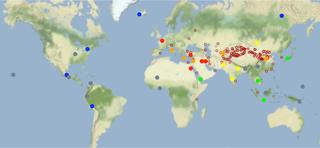Rhinocrates
ACCESS: Top Secret
- Joined
- 26 September 2006
- Messages
- 3,053
- Reaction score
- 7,781
Archaeology tracks the diffusion of culture, and technologies and isotopic analysis and genetics has revealed some astonishing things about the movement of goods and people around the ancient world (you can learn a lot about where someone grew up from Strontium in their tooth enamel). This article caught my eye, looking at the diffusion of military technologies.
Abstract
What have been the causes and consequences of technological evolution in world history? In particular, what propels innovation and diffusion of military technologies, details of which are comparatively well preserved and which are often seen as drivers of broad socio-cultural processes? Here we analyze the evolution of key military technologies in a sample of pre-industrial societies world-wide covering almost 10,000 years of history using Seshat: Global History Databank. We empirically test previously speculative theories that proposed world population size, connectivity between geographical areas of innovation and adoption, and critical enabling technological advances, such as iron metallurgy and horse riding, as central drivers of military technological evolution. We find that all of these factors are strong predictors of change in military technology, whereas state-level factors such as polity population, territorial size, or governance sophistication play no major role. We discuss how our approach can be extended to explore technological change more generally, and how our results carry important ramifications for understanding major drivers of evolution of social complexity.

 journals.plos.org
journals.plos.org
I wonder what will be the drivers, enablers and implications of emerging technologies? I'm curious about the really broad and long-term sweep - archaeology has suffered many hijackings by those with nationalistic and ethnocentric agendas but that nonsense is not the point. Instead, what is the equivalent of ironworking or cavalry that may emerge or be emerging already?
Air power is an obvious key emergence, so is the twentieth century innovation of the concept of total war (as an economic system in the modern nation-state). WMDs and the doctrine of deterrence is probably the most significant - and strange. In many ways, it's a return to ancient modes of limited warfare except on a fully global scale. That is, elaborate and prohibitively expensive weapons available only to a few are deployed with the intention that they not be used. In ethnographic circles, it's called 'potlatch' - extravagant competitive expenditure (and in many cases, ceremonial destruction of massive stockpiles of goods and weapons in front of rivals) sublimates actual 'kinetic' aggression. Will future 'hybrid war' be more overtly theatrical rather than covert? What technologies would such a trend favour?
Abstract
What have been the causes and consequences of technological evolution in world history? In particular, what propels innovation and diffusion of military technologies, details of which are comparatively well preserved and which are often seen as drivers of broad socio-cultural processes? Here we analyze the evolution of key military technologies in a sample of pre-industrial societies world-wide covering almost 10,000 years of history using Seshat: Global History Databank. We empirically test previously speculative theories that proposed world population size, connectivity between geographical areas of innovation and adoption, and critical enabling technological advances, such as iron metallurgy and horse riding, as central drivers of military technological evolution. We find that all of these factors are strong predictors of change in military technology, whereas state-level factors such as polity population, territorial size, or governance sophistication play no major role. We discuss how our approach can be extended to explore technological change more generally, and how our results carry important ramifications for understanding major drivers of evolution of social complexity.
Rise of the war machines: Charting the evolution of military technologies from the Neolithic to the Industrial Revolution
What have been the causes and consequences of technological evolution in world history? In particular, what propels innovation and diffusion of military technologies, details of which are comparatively well preserved and which are often seen as drivers of broad socio-cultural processes? Here we...
I wonder what will be the drivers, enablers and implications of emerging technologies? I'm curious about the really broad and long-term sweep - archaeology has suffered many hijackings by those with nationalistic and ethnocentric agendas but that nonsense is not the point. Instead, what is the equivalent of ironworking or cavalry that may emerge or be emerging already?
Air power is an obvious key emergence, so is the twentieth century innovation of the concept of total war (as an economic system in the modern nation-state). WMDs and the doctrine of deterrence is probably the most significant - and strange. In many ways, it's a return to ancient modes of limited warfare except on a fully global scale. That is, elaborate and prohibitively expensive weapons available only to a few are deployed with the intention that they not be used. In ethnographic circles, it's called 'potlatch' - extravagant competitive expenditure (and in many cases, ceremonial destruction of massive stockpiles of goods and weapons in front of rivals) sublimates actual 'kinetic' aggression. Will future 'hybrid war' be more overtly theatrical rather than covert? What technologies would such a trend favour?
